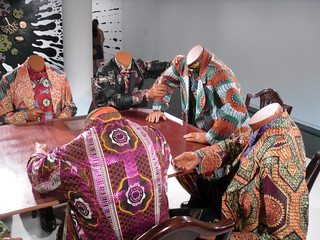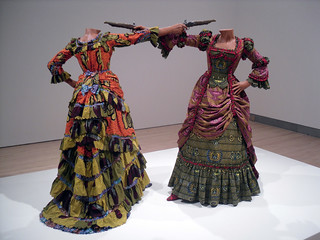King Leopold Haunts Congo Again
As a son of an African journalist, the BBC World Service tends to act as my alarm clock. And so on Thursday morning, I woke up to the sounds of a bizarre story:
A statue of former Belgian colonial King Leopold II has been re-erected in the centre of the Democratic Republic of Congo capital, Kinshasa.Now it seemed clear to me that I must have been in the middle of a dream and so I thought nothing better of it. In the afternoon though, my curiosity stirred, I checked their news site and found to my amazement that indeed, it was true: Leopold's statue was back up.
King Leopold II set up the Congo Free State in 1885 as his personal possession and left arguably the worst legacy of all the European colonial regimes... He turned the country into a massive labour camp, made a fortune for himself from the harvest of its wild rubber, and contributed in a large way to the death of perhaps 10 million innocent people.Culture Minister Christophe Muzungu said people should not just see the negative side of the king - they should also look at the positive aspects.
"We are restoring the history of our country because a people without history is a people without a soul," he said.
I sputtered and struggled to find the appropriate historical analogue to this decision. It was as if the Chechens had decided to put up Stalin's statue in Grozny - he who had decimated their ranks 60 years ago by deporting all of them from their lands in forced marches to Siberia - or perhaps as if the mayor of Gaza took it to his head to erect Ariel Sharon's statue (or a new monument to Saddam in Kurdistan?).
Leopold's depredations were so grotesque and occurred on such a scale that even the other colonial powers had to take pause in their scramble for African loot. The Belgian behavior was the kind of thing that would queer the whole colonial enterprise and indeed the twentieth century's first significant talk about human rights was on the Congo issue. In much the same way, the images from Abu Ghraib prompted a (slight) sense of unease in the recent US empire building. More to the point, the colonial experience under Leopold set Congo on a downward path that it has never been able to escape.
Now I've read King Leopold's Ghost, Adam Hochschild's highly recommended study of that macabre period and was justifiably horrified at the historical record that he laid out: greed, megalomania mixed with atrocious labour camps, summary amputations, decapitations and outright larceny, all covered in the bromides of a missionary humanitarianism. Almost any page of that book would be a rejoinder to that Minister of culture's words. 10 million people died for God's sake, and he stole everything from you!
Perhaps the only decision Mobutu ever took that proved to be in the interest of his country was to tear that statue down early on in his reign, even though this measure did coincide with his self-interest as was the overriding norm for him.
If Mobutu's reign was to be the farcical follow-up of the Leopold's tragedy, one had hoped that whatever followed would begin to restore that country to some sense of sanity. Instead, in the Kabila interludes (first the elder, and now the hereditary son), Congo remains the site of a second Scramble for Africa (see here also).
Congo is so rich in natural resources that even normally sober Texan oilmen or South African diamond monopolists hyperventilate when they talk about it. It has copper, gold, diamonds, tin - you name it. It has uranium (if you wanna go nuclear) and even that rare tantalite that's in your cell phone.
At one point in the past decade, it was said that the armies of 13 countries were on its soil, not to mention Russian mercenaries and the usual cast of malfeasants - Africa's World War it was called. The resultant human cost of the ongoing Congo troubles, 3 million and rising, is approaching Leopoldian dimensions. The notion that a government would make such gestures says everything about the dysfunction of the country and tone-deafness of the opportunists who pass for politicians there.
The next day however, it appeared that the outcry had grown too large and the statue was removed: Leopold reigns for a day in Kinshasa
Residents of Kinshasa could be forgiven for rubbing their eyes in disbelief.While I am happy to see that this decision was reversed, do note the crucial line I emphasized above: there are plans for a Mobutu statue. Pity the poor Congolese, first King Leopold's ghost returns to haunt them, now they're going to have to endure Mobutu again! File under: Africa, Congo, irony, murder, colonialism, history, memory, toli, Leopold, Mobutu,, rogues, culture, observation, perception, Fallen Angels, Observers are worriedFirst, a statue of the late Belgian king Leopold II, whose rapacious colonial rule of Congo caused the death of millions of Africans, was reinstated in the heart of the Congolese capital.
Then, less than a day later, it was gone again, mysteriously removed by the same workmen who had erected it.
Officials were at a loss to explain the comings and goings at the end of June 30 Boulevard, the street named in honour of the date of Congo's independence from Belgium.
First indications from the government were that it might be part of a historical restoration. There are plans to erect a statue of Mobutu Sese Seko, the dictator who stole billions from the country during a 30-year rule that ended in 1997.
"We are restoring the history of our country, because a people without history is a people without a soul," said Christophe Muzunge, the minister of culture. He added that the six-metre (20ft) Leopold statue had been brought back to remind the people of their country's colonial past, so that "it never happens again".
But later there was no comment on why Leopold had been removed. Certainly the sudden apparition was not popular with onlookers.
"Look at what they did in Iraq," Mputu Melo said. "They destroyed the statue of Saddam Hussein. This shouldn't be in a public square."
King Leopold, who never set foot in the Congo, controlled the vast country as his personal colony from 1885 to 1908, when it was handed over to Belgian government rule.
During those decades his agents enslaved its people to harvest rubber, beating workers with a hippo-hide whip known as the chicotte and severing the hands of men, women and children who failed to meet their quotas.
As many as 10 million Congolese are estimated to have died as a result of executions, unfamiliar diseases and hunger.




4 comments:
I've just visited the exhibition (Memories of Congo) in the Musee Royal de L'Afrique Centrale outside Brussels. While interesting, and although in French, not my spokem language, I was disappointed that the harmful side of Leopold's era was not explicit. If I hadn't read about the colonial era in recent newspapers, the nuseum visit would have seemed more intersting than questionable.
The Belgians at least are becoming sensitized to their awful colonial legacy, presumably because of what transpired in Rwanda in recent memory and for example the things we have learnt about the death of Lumumba, the connections with Mobutu and other nefarious episodes.
But I can relate to their dilemma: no one really wants to hear about skeletons in the closet even if there is an argument for the cathartic effect of airing them. This is true in the South of the US, this is true even recently in South Africa about apartheid to take just two examples (and I'll be writing on South Africa shortly)
There were no choirboys in the colonial past. Even those more enlightened colonists, the Danes and the Dutch, have problems with their legacy (e.g. admitting your ancestors were slave traders is difficult) although being sensible northern european types, they are very even-handed and straightforward about their misdeeds and pay penance with some of the most effective development programs (and quiet too, not like the Americans who complain loudly about aid but don't actually disburse much - see the "milleninum challenge accounts")... But back to my thread, it is hard to change attitudes especially when it calls into question royalty...
Behind the Zimbabwe National Archives in Harare, you will find all the statues removed at independence in 1980. Abandoned, covered with vines, many toppled over, they are slowly being swallowed by the African bush. That garden of decay is the only fitting monument to colonialism I have seen.
It is sad to the Christianizion of africa has stole the afican sole.Its intention has left the african in a duldrum. These Christain men has corupt the ways of the African and has left in a state of constant turmoil
Post a Comment